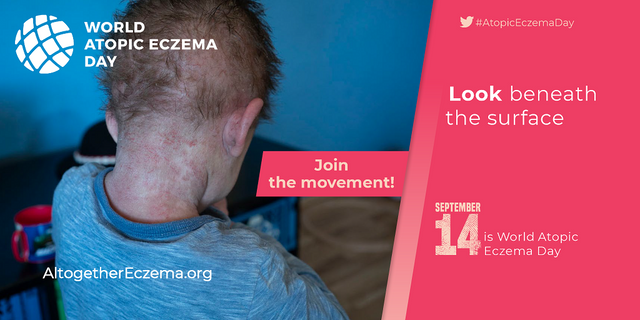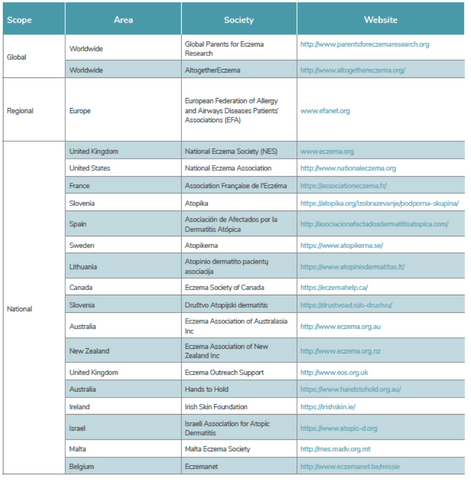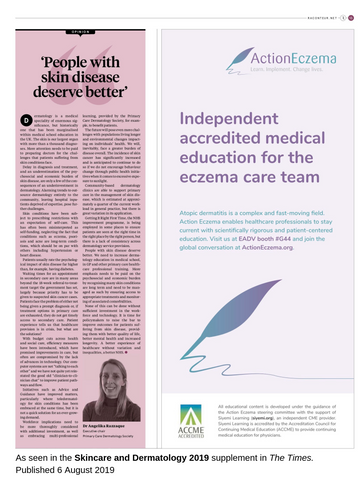
Atopic dermatitis and confidence: a team effort
Beauty is in the eye of the beholder
Atopic dermatitis (AD), or eczema, is a visible and chronic skin condition affecting both adults and children. The Skincare & Dermatology 2019 special report, recently issued in The Times, considers how social media can both positively and negatively influence people with skin conditions in our image-obsessed culture.
This week marks National Eczema Week in the United Kingdom (UK), and the theme this year (14–22 September 2019) is confidence. The organisers of this week, National Eczema Society, aim to promote confidence among patients and carers in managing eczema, as well as confidence in asking for the right medical care when it is needed. This follows the recent World Atopic Eczema Day on 14 September 2019, an awareness campaign organised by the International Alliance of Dermatology Patient Organizations (IADPO), also known as GlobalSkin, and precedes the National Eczema Awareness Month this October in the United States (US).
It is therefore timely to reflect on the influence of social media, and consider how healthcare professionals and patient support groups can help people with AD improve their quality of life.

Social media and patient support groups
Instagram and other social media platforms can serve as an educational tool and a refuge for those struggling with a condition, but also as a source of misinformation and unhappiness. In a survey conducted by Ofcom, 44% of Instagram users reported editing their photos before posting, and on average respondents took six photos of themselves for every selfie they posted.1
Dr Anjali Mahto, consultant dermatologist at the Cadogan Clinic, says selfies and Instagram invariably come up in consultations, with patients often proffering filtered versions of themselves as their desired end-goal.
“At the end of the day, your face is your calling card in many situations, both socially and professionally, and being constantly bombarded with images of radiant, glowing skin can skew your perception of normal.”
Dr Anjali Mahto
Consultant dermatologist
Cadogan Clinic
Instagram advice very rarely constitutes sound medical advice, but some influencers, who command huge followings, are able to dispense misinformation to a large audience. “A narrative is much more convincing than a doctor,” Dr Mahto comments. However, support communities do exist for people with particular skin complaints, such as eczema, and these can be a welcome resource and support network for people suffering with AD.
Patient support and advocacy groups are dedicated to providing patients and caregivers with independent and practical advice on AD treatment and management options, and to raising awareness of the needs of those with eczema. Multiple global, regional and national patient advocacy groups are currently available to patients with AD and their families (Table). To download the list of patient advocacy groups as a resource click here.
Table 2. Eczema patient advocacy groups.

The medical care team
Patient support and education are essential elements of holistic care for adults with AD. Supportive education increases patient satisfaction and results in improved clinical outcomes and adherence.2 Patient education begins with a one-to-one exchange between patient and clinician to impart self-management skills and convey ongoing care.2 Other forms of patient education, such as information available online, patient action plans and patient groups, are also effective.
Educational and psychological training programmes may be effective for chronic skin conditions.3 One study investigated quality of life improvement in patients with chronic skin conditions following completion of an education programme.3 The 12-week intervention included cognitive education on skin and general health issues alongside stress-reducing techniques, with preliminary results showing that quality of life in patients with chronic skin diseases improved significantly after completing the programme.
In a recent systematic review analysing 20 randomised control trials of educational strategies for patients with AD, common features of the strategies included an emphasis on the patient-clinician relationship, the use of written action plans and information on AD symptom and medication management.4 The authors concluded that no single approach was superior to others, and that all interventions have the potential to improve self-management skills and outcomes for patients with AD.4
However, to be successful, almost every patient support strategy —printed material, online resource, or video— needs to be supplemented with some degree of verbal support from the physician. In the absence of any verbal support the effectiveness of patient action plans is reduced.2
To learn more about support groups and how to improve quality of life in AD, visit our online CME course ‘Disease burden and quality of life in atopic dermatitis’. To find out more about current research in AD, including global trends and new data on the management of eczema, explore our new Congress Report online courses:

About Action Eczema
Action Eczema recently appeared in the Skincare & Dermatology special report, which highlights the importance of evidence-based patient support and promoting confidence in people who are suffering from AD.
Action Eczema is a global learning community designed to support all health professionals involved in the care of patients with AD. We provide a range of online CME courses to facilitate increased knowledge, competence, confidence, and performance related to eczema care.
We support the Primary Care Dermatology Society’s call for better education and workforce training in dermatology.
References
-
Ofcom: The Communications Market 2017. https://www.ofcom.org.uk/research-and-data/multi-sector-research/cmr/cmr-2017. Accessed September 18 2019.
-
Zirwas MJ, Holder JL. Patient education strategies in dermatology. Part 2: methods. J Clin Aesthet Dermatol. 2009;2(12):28-34.
-
Lambert J, Bostoen J, Geusens B, et al. A novel multidisciplinary educational programme for patients with chronic skin diseases: Ghent pilot project and first results. Arch Dermatol Res. 2011;303(1):57-63.
-
Ridd M, King A, Le Roux E, Waldecker A, Huntley A. Systematic review of self-management interventions for people with eczema. Br J Dermatol. 2017;177(3):719-734.